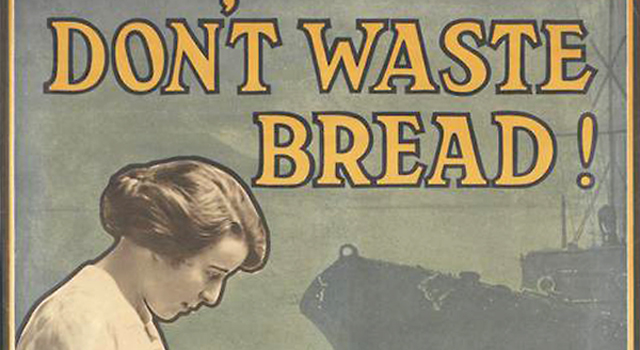Articles

No Comments
By Voices
On 23, Feb 2015 | No Comments | In Gender | By Voices
Sophie Carey and the National Food Fund
Dr Katherine Storr
When the First World War began new charitable funds proliferated and many were started by women. Goods-in-kind, such as clothes and food were collected and distributed as well as money. Food is a weapon of war and Britain was vulnerable due to its reliance on imports.
![Ministry of Food Poster, 1917 [Imperial War Museum PST13354]](http://www.voicesofwarandpeace.org/wp-content/uploads/2015/02/dontwastebread-600.jpg) It was recognised that there would be shortages and that some people, especially the poor, or those who suffered as a result of the war, might go hungry. A charity that focussed on alleviating this particular distress was the National Food Fund started by Sophie Carey in conjunction with the Women’s Emergency Corps.
It was recognised that there would be shortages and that some people, especially the poor, or those who suffered as a result of the war, might go hungry. A charity that focussed on alleviating this particular distress was the National Food Fund started by Sophie Carey in conjunction with the Women’s Emergency Corps.
However, fund-raising created the possibility of dishonesty, theft and fraud. In fact, relief fund money became a scandal so that official control was needed and resulted in the passing of the War Charities Act in August 1916. There were many types of fraud. Subtle fraud was perpetrated by promoters of genuine charities who took large ‘honoraria’ for themselves; there were dishonest workers for respectable charities, and confidence tricksters who began bogus organisations which spent little or none of the receipts on the avowed purposes. There were also fraudulent and inefficient charities. Whether Miss Sophie Carey’s charities fit into any of these categories is uncertain but the funds with which her name was associated were the subject of many enquiries and allegations.
Miss Carey first comes to our notice as the provider of free food for 300 Belgian refugees who unexpectedly arrived in early August 1914. She was also remarkably successful at getting in necessary money and when she had sufficient and a large enough staff of helpers she separated from the Women’s Emergency Corps and formally opened the National Food Fund at premises lent to her cost free at 1a Dover Street, Piccadilly. Before long, the Food Fund supplied the four great Belgian refugee hostels set up in London by the War Refugees Committee, for whom they became official distributing agents. They also helped 100,000 Belgian refugees, and 6,000 wounded, received in Folkestone in October following the fall of Antwerp.
Before the end of the year some of her most enthusiastic supporters, including Lady Chance and Miss Mason became worried about the NFF’s affairs, and Miss Carey’s methods. An article in Truth, outlining previous financial enterprises, brought matters to a head. On 28 October she, and three of her colleagues, were ejected from the Fund.
A Home Office meeting in May, 1916, gives information about Miss Carey’s subsequent work with other Funds, including the Belgian Soldiers Fund and the Belgian Canal Boat Fund. It is uncertain whether she founded these, but she certainly worked with them to help hapless civilians in the free part of Belgium. Was she a clever ‘con-artist’, an inefficient but well-meaning muddler or was this the result of the gender war? The various investigations did not convict her of any wrong-doing, but her innocence remains open to question.



Submit a Comment